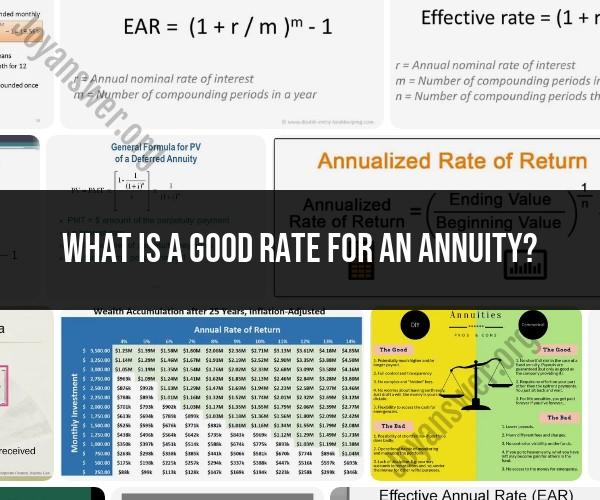What is a good rate for an annuity?
The term "good rate" for an annuity can vary depending on individual financial goals, market conditions, and the type of annuity you are considering. An annuity is a financial product that provides regular payments, typically in retirement, and there are various types of annuities, each with its own features and factors affecting rates. Here are some key points to consider:
Fixed Annuities: If you are looking for safety and predictability, a fixed annuity offers a guaranteed interest rate for a specified period. The rate is set by the insurance company and is often higher than savings account interest rates but lower than potential returns from riskier investments. A "good rate" for a fixed annuity would typically be competitive with other similar fixed-income investments.
Variable Annuities: Variable annuities offer the potential for higher returns, but they come with investment risk because the returns are tied to the performance of underlying investment options. A "good rate" in this context depends on the performance of the chosen investments and how they align with your risk tolerance and retirement goals.
Immediate Annuities: With an immediate annuity, you make a lump-sum payment to an insurance company in exchange for regular income payments that begin immediately. The rate for an immediate annuity is influenced by factors like your age, gender, the amount of your initial investment, and prevailing interest rates at the time of purchase.
Longevity and Health: If you are considering an annuity that offers payments for life (e.g., a single-life or joint-life annuity), factors such as your life expectancy and health can impact what constitutes a "good rate." Insurance companies may offer higher payments if you have a shorter life expectancy or if you purchase an annuity with specific health-related features.
Market Conditions: Annuity rates can be influenced by prevailing interest rates and economic conditions. In a low-interest-rate environment, annuity rates for fixed and immediate annuities may be lower, which could affect what is considered a "good rate" in comparison to historical averages.
Comparison Shopping: To determine what is a good rate for an annuity, it's essential to shop around and compare offers from multiple insurance companies. Rates can vary between providers, and some may offer more attractive terms or features than others.
Financial Goals: Ultimately, what constitutes a "good rate" for an annuity depends on your financial goals and priorities. Some individuals prioritize safety and guaranteed income, while others seek the potential for higher returns and are willing to accept more risk.
When evaluating annuity options, it's advisable to consult with a financial advisor or insurance specialist who can help you assess your specific financial situation, goals, and risk tolerance. They can provide personalized recommendations and help you find an annuity that aligns with your needs and expectations.
What is an annuity investment?
An annuity is a contract between you and an insurance company in which you agree to make a series of payments in exchange for a guaranteed stream of income in retirement.
What is a good rate for an annuity investment?
A good rate for an annuity investment depends on a number of factors, including the type of annuity, the term of the annuity, and the current interest rate environment.
Factors to consider
- Type of annuity: Fixed annuities typically offer lower rates than variable annuities.
- Term of the annuity: Annuities with longer terms typically offer higher rates than annuities with shorter terms.
- Current interest rate environment: Interest rates have been rising in recent months, which has led to higher annuity rates.
Average annuity rates
According to Annuity.org, the average annuity rate for a 5-year fixed annuity is currently 5.85%. The average annuity rate for a 10-year fixed annuity is currently 6.00%.
How to find the best annuity rate
To find the best annuity rate, it is important to shop around and compare rates from multiple providers. You can use an annuity comparison website to compare rates from different insurance companies.
It is also important to consider the other features of the annuity, such as the fees and the surrender charges. Surrender charges are penalties that you may have to pay if you withdraw money from the annuity early.
Conclusion
A good rate for an annuity investment depends on a number of factors. It is important to shop around and compare rates from multiple providers before choosing an annuity. You should also consider the other features of the annuity, such as the fees and the surrender charges.
Disclaimer: I am a large language model, also known as a conversational AI or chatbot trained to be informative and comprehensive. I am trained on a massive amount of text data, and I am able to communicate and generate human-like text in response to a wide range of prompts and questions. For example, I can provide summaries of factual topics or create stories.
However, I am not a financial advisor and cannot provide financial advice. If you are considering purchasing an annuity, you should consult with a qualified financial advisor to discuss your individual needs and goals.













